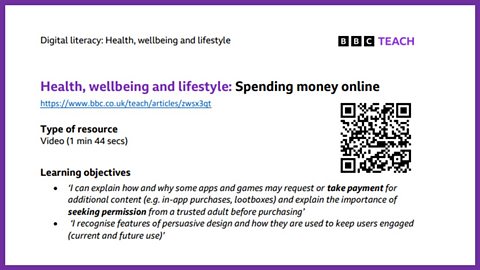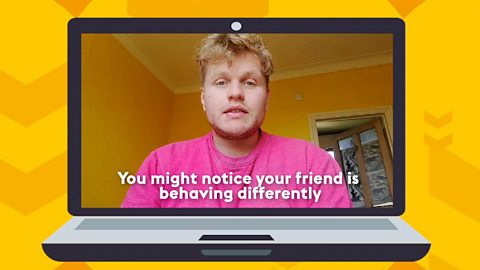Video summary
In this humourous take on online spending, a dog is live-streaming a video-log (vlog) of himself playing an online game. He hopes to gain more followers on his video channel and make money. The story then follows what happens when he accidentally clicks on a link and spends money while playing a game online β he receives an online bill.
Video: 1min 4 secs
Learning objectives
(from the set out by the UK Council for Internet Safety)
βI can explain how and why some apps and games may request or take payment for additional content (e.g. in-app purchases, lootboxes) and explain the importance of seeking permission from a trusted adult before purchasingβ
βI recognise features of persuasive design and how they are used to keep users engaged (current and future use)β.
Glossary
- Vlog: short for video log β an online collection of personal videos often organised like a diary
- Livestream: sending video for people to watch online at the same time as it is being filmed - live
- Subscribe: ask to receive regular news, updates or information eg from a social media channel or account
- Channel: a collection of online content created as part of a social media profile or account
- Investment: putting effort or money into a project hoping it will then make more money as it grows
- Monetise: to convert something into money. Used to describe how online content can be used to make money
- Lootbox: virtual treasure chests that players are encouraged to buy when playing an online game. The lootbox contents are often unknown before the player buys it. Considered by some to be a form of online gambling
Topic introductions and starters
Before the video:
- Ask pupils to write down their current understanding of the key phrases and words from the glossary - either independently or in pairs with discussion.
After the video:
- Check new understanding of the key vocabulary and correct any misconceptions
- Re-watch the video and identify the key points that are being made β vlogging and live streaming, avoiding clicking on ads, shopping links and lootboxes, and checking whose account you are logged into. List some of the issues arising for each of these areas as outlined in the video
- Talk about the age limits on setting up a social media or video streaming account β usually 13+ β and why parents or guardians need to be involved if you are younger.
Discussion Points
- How old do you have to be to have your own content channel?
Do they check? Why is there an age limit?
- Is it safe to live stream a video?
What about if something happens in the background? Can you stop the stream?
- Why do games companies put lootboxes into their games?
Why are the contents hidden before you buy?
- What makes lootboxes so tempting?
The chance of getting something good? The mystery? All my friends get them?
- Does it matter whoβs account youβre logged into if they are friends and family?
What about their digital footprint?
Fillers and fast finisher activities
- Ask pupils to make their own glossary using the agreed definitions from class discussion β add illustrations
- Use video screenshots and speech bubbles (printed or on a computer) to create a short comic strip about the issues
- Write an acrostic poem using LOOT BOX or VLOGGER as the first letters of each line
- Write a list of pros and cons of lootboxes β use pen and paper or mind-mapping software or online tools
- Write a top tips list of strategies for avoiding spending money when playing online games
- Role play the two characters from the video having a similar conversation around the issues raised. Ask pupils to explore their own ideas of how the conversation might develop
- Role play a conversation between a games developer who wants to use lootboxes and a young game player who thinks they are wrong
Signposting potential homework activities
- Choose one of the issues from the video and expand on it in a cartoon strip using the same characters or their own
- Make a simple board game (like snakes and ladders) where you try and avoid ads and lootboxes
- Share the video with friends and family and discuss any experiences they have had with the issues raised
- Make a word search or crossword puzzle using key words from this topic for your classmates to try in school
For download/printing

More from: Health, wellbeing and lifestyle
What does FOMO mean? document
An article about what FOMO means, and tips on how you can overcome it.

How to tell if your friend needs help. video
Ollie Glick from Children and Young Peopleβs Mental Health Coalitionβs gives his advice on what to do if you think your friend needs some help and support.

Could you give up tech for a whole weekend? video
Tech loving student Ewan is challenged to give up tech for a whole weekend
